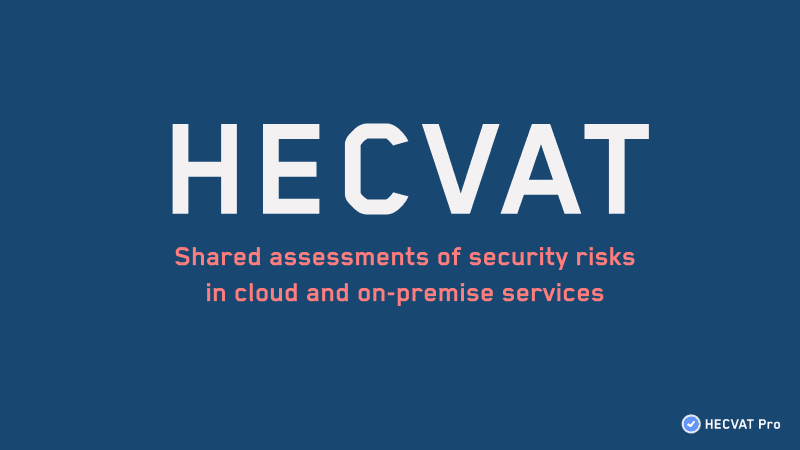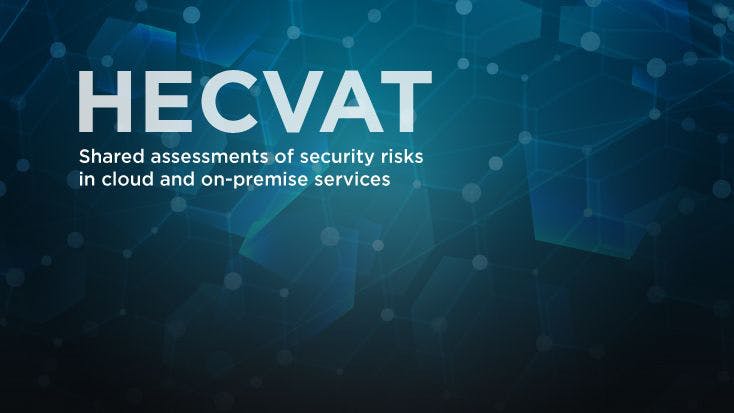Table of Contents
ToggleImplementing Data Privacy in Education | HECVAT Pro
Educational institutions handle vast amounts of sensitive data, including student records, financial information, and personal details. Ensuring the privacy and security of this data is crucial to maintain trust and comply with legal requirements. In this article, we’ll explore the key steps educational institutions can take to implement effective data privacy measures.
1. Conduct a Thorough Data Inventory

The first step in implementing effective data privacy measures is to conduct a comprehensive data inventory. Educational institutions should identify all the types of data they collect, store, and process. This includes student records, faculty and staff information, financial data, and any other sensitive information.
By understanding the scope and nature of the data they handle, institutions can better assess the risks and develop appropriate safeguards. Our HECVAT Guides provide valuable insights on conducting a thorough data inventory.
2. Develop a Data Privacy Policy
Once the data inventory is complete, educational institutions should develop a comprehensive data privacy policy. This policy should outline the institution’s commitment to protecting personal data, the principles they adhere to, and the measures they have in place to ensure data privacy.
The policy should cover topics such as data collection, storage, access control, data sharing, and incident response. It should also address compliance with relevant laws and regulations, such as FERPA and GDPR. Our HECVAT consulting services can help institutions craft a robust data privacy policy.
3. Implement Access Controls
Controlling access to sensitive data is a critical aspect of data privacy. Educational institutions should implement strict access controls to ensure that only authorized individuals can access personal information on a need-to-know basis.
This can be achieved through role-based access control (RBAC), where users are granted access based on their job responsibilities. Additionally, institutions should implement strong authentication mechanisms, such as multi-factor authentication (MFA), to prevent unauthorized access. Our HECVATPro services can assist in implementing effective access controls.
4. Encrypt Sensitive Data
Encryption is a powerful tool for protecting sensitive data both in transit and at rest. Educational institutions should encrypt data whenever possible, especially when it is being transmitted over networks or stored on devices.
Encryption ensures that even if data is intercepted or accessed by unauthorized parties, it remains unreadable without the proper decryption keys. Institutions should use strong encryption algorithms and manage encryption keys securely. Our HECVAT articles provide valuable insights on encryption best practices.
5. Regularly Train Faculty and Staff
Data privacy is not just a technical issue; it also requires the active participation and awareness of faculty and staff. Educational institutions should provide regular training to all employees on data privacy best practices, policies, and procedures.
Training should cover topics such as data handling, incident reporting, and the consequences of data breaches. It should also emphasize the importance of maintaining confidentiality and the individual’s role in protecting sensitive information. Our consulting services can help develop effective training programs.
6. Conduct Regular Risk Assessments
Implementing data privacy measures is an ongoing process that requires regular monitoring and assessment. Educational institutions should conduct periodic risk assessments to identify potential vulnerabilities and evaluate the effectiveness of their data privacy controls.
Risk assessments should cover both technical and non-technical aspects, such as network security, access controls, employee awareness, and third-party service providers. Based on the assessment findings, institutions can prioritize and address identified risks. Our HECVAT guides provide valuable insights on conducting risk assessments.
7. Establish Incident Response Plans
Despite the best efforts to prevent data breaches, incidents can still occur. Educational institutions should establish well-defined incident response plans to effectively detect, respond to, and recover from data privacy incidents.
The incident response plan should outline the roles and responsibilities of the incident response team, the steps to be taken in the event of a breach, and the communication protocols for notifying affected individuals and relevant authorities. Regular testing and updating of the plan are essential to ensure its effectiveness. Our HECVAT consulting services can assist in developing robust incident response plans.
8. Manage Third-Party Risks
Educational institutions often rely on third-party service providers for various functions, such as cloud storage, learning management systems, and data processing. It is crucial to assess and manage the data privacy risks associated with these third parties.
Institutions should conduct thorough due diligence on service providers, including reviewing their data privacy policies, security measures, and compliance certifications. Contractual agreements should clearly define data privacy obligations and responsibilities. Regular monitoring and auditing of third-party providers are essential to ensure ongoing compliance. Our HECVATPro services can help manage third-party risks effectively.
9. Adhere to Relevant Laws and Regulations
Educational institutions must comply with various laws and regulations related to data privacy, such as FERPA, COPPA, and GDPR. It is essential to understand the specific requirements of these regulations and ensure compliance throughout the institution’s data handling practices.
Institutions should designate a data protection officer (DPO) or a privacy team to oversee compliance efforts, stay updated on regulatory changes, and provide guidance to faculty and staff. Our consulting services can assist institutions in navigating the complex landscape of data privacy regulations.
10. Foster a Culture of Data Privacy
Implementing effective data privacy measures requires more than just technical controls; it also requires a culture that values and prioritizes data privacy. Educational institutions should foster a culture where data privacy is seen as a shared responsibility and an integral part of the institution’s values.
This can be achieved through regular communication, awareness campaigns, and the active involvement of leadership in promoting data privacy. Institutions should encourage open discussions about data privacy concerns and provide channels for reporting potential issues. Our HECVAT articles offer valuable insights on building a strong data privacy culture.
Conclusion
Implementing effective data privacy measures in educational institutions is a critical task that requires a comprehensive approach. By conducting a thorough data inventory, developing a robust data privacy policy, implementing access controls, encrypting sensitive data, and regularly training faculty and staff, institutions can significantly enhance their data privacy posture.
Additionally, conducting regular risk assessments, establishing incident response plans, managing third-party risks, adhering to relevant laws and regulations, and fostering a culture of data privacy are essential components of a successful data privacy program.
At HECVATPro, we offer a range of services and resources to help educational institutions navigate the complexities of data privacy. From consulting services and HECVAT guides to HECVATPro solutions, we are committed to assisting institutions in implementing effective data privacy measures and safeguarding sensitive information.
By prioritizing data privacy and taking proactive steps to protect personal data, educational institutions can maintain the trust of students, faculty, staff, and stakeholders while ensuring compliance with legal requirements. Investing in data privacy is not only a legal obligation but also a moral imperative in today’s digital landscape.



